Following the resignation of Jacob Zuma as South African president on Wednesday night, his erstwhile deputy and leader of the ruling African National Congress, ANC, Cyril Ramaphosa on Thursday mounted the saddle as the fifth president of South Africa.
But before he settles into steering the country out of its myriad of challenges, here are ten things you need to know about the new leader:
1. Ramaphosa was born on November 17, 1952 in Soweto, an impoverished township in Johannesburg, and obtained a law degree in 1981 through correspondence studies with the University of South Africa, UNISA.
2. His activities as an integral part of the anti-apartheid movement saw him spending time in jail on two occasions in the 1970s. He was arrested in Lebowa, on the charge of organising or planning to take part in a meeting in Namakgale which had been banned by the local magistrate.
3. Ramophosa formed the influential National Union of Mineworkers, NUM, in the 1980s and led some of the country’s biggest strikes, which shook the foundations of the apartheid-era economy.
4. His work as lead negotiator with the outgoing white government of F.W. de Klerk helped end apartheid in 1994.
5. He also helped craft the rainbow nation’s post-apartheid constitution, considered to be one of the most liberal in the world.
6. Ramophosa had hoped to succeed Nelson Mandela, but this hope was dashed when he lost out to Thabo Mbeki in the race to become South Africa’s deputy president under Mandela.
7. Ramaphosa married Tshepo Motsepe, the sister of South Africa’s richest black businessman, Patrice Motsepe.
8. After he couldn’t succeed Mandela as president, Ramaphosa withdrew from the center-stage of politics and started a lucrative career in the private sector. His Shanduka Group acquired stakes in mining firms, a mobile operator and McDonald’s South African franchise.
9. In 2014, he became one of the country’s richest men when he divested from Shanduka, which at the time was worth more than $580 million. His step away from business pursuits was made in a bid to avoid conflicts of interest after Zuma appointed him as South Africa’s deputy president that year.
10. Seen as a problem solver, Ramaphosa led the Southern African Development Community, SADC, delegation that was involved in fixing the political crisis in Lesotho caused by the failed coup attempt in 2014




